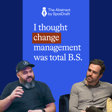
Ep 97: From First Legal Hire to EMEA GC with Volker Weisshaar, Sonos
What's it like to be the first European legal hire for a fast-growing tech company? How do you build out a European legal team? And where is the European tech sector headed?
Join Volker Weisshaar, General Counsel EMEA at Sonos, as he talks about establishing and scaling European legal teams for US tech giants NetApp and Sonos, and what it takes to help these companies thrive in the regulation-heavy and culturally diverse landscape of the EU.
Listen as Volker discusses his approaches to hiring at NetApp and Sonos, taking on an operator function and getting your hands dirty as you build a new office, evolving your leadership style in a growing business, key differences between European and US regulations, and much more.
Read detailed summary: https://www.spotdraft.com/podcast/episode-97
Topics
Topics Introduction 0:00
Living and working in Amsterdam: 2:24
Europe’s tech and startup scene: 2:27
What motivated Volker to become a tech lawyer: 3:44
Being the first European legal hire at Sonos and NetApp: 11:10
Approaches to building out a legal team: 14:54
Being a lawyer and an operator: 16:52
Joining Sonos: 19:01
Evolving as a leader: 23:12
Managing your relationship with a global CLO: 26:10"
Differences between US and EU regulations: 28:48
Europe’s start-up scene and regulation: 34:41
Biggest challenges at Sonos: 40:24
Leveraging AI: 44:41
Proudest accomplishments at Sonos: 47:29
Rapid-fire questions: 49:07
Connect with us:
Volker Weisshaar - https://www.linkedin.com/in/volkerweisshaar/
Tyler Finn - https://www.linkedin.com/in/tylerhfinn
SpotDraft - https://www.linkedin.com/company/spotdraft
SpotDraft is a leading contract lifecycle management platform that solves your end-to-end contract management issues. Visit https://www.spotdraft.com to learn more.



















